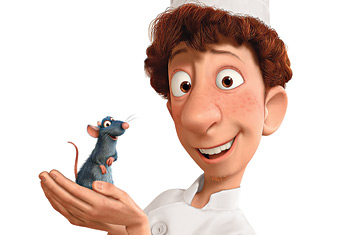
The animated character Linguini, here holding Remy, in a scene from the animated film Ratatouille.
(2 of 2)
The font of this friendly, funky vibe is Lasseter, the jolly round fellow (any cartoonist could draw him in two seconds and three circles) with a weakness for assaultively colorful Hawaiian shirts. In the mid-'80s, this Disney renegade began making computer-animated shorts, one of which, Tin Toy, won an Oscar six years before he finished Pixar's first feature, 1995's Toy Story. That movie changed animation history, as Walt Disney had in 1937 with Snow White and the Seven Dwarfs. Like Walt in his early genius period, Lasseter saw that the secret of an animated movie is story and characters--and the enemy of innovation is complacency. "We fear becoming a studio where we act like we know what we're doing when we don't." Bird agrees: "For better or for worse, Pixar is always gonna throw itself in the deep end and try to figure out a way to not drown. I love that about this place."
When he starts work on a movie, Bird looks for core thoughts. The core here: "Cooks are givers, and rats are takers. In the larger world there are people who are givers and people who are takers. Cooking, feeding people, is a giving act. All art at its best is a giving act that continues to give as long as the art is consumed. As with a cook, you're handing it over to someone to enjoy."
Toward the end of the movie, Remy whips up his specialty for Anton Ego (voiced by Peter O'Toole), a food critic so severe he is known to trembling chefs throughout Paris as the Grim Eater. Ego puts a forkful in his mouth, and in a flash, fond memories--of a loving mother giving him delicious food--play across his face. As Bird describes the moment, "His eyes drift down toward the dish, like, 'Is it this? It is this. I love food again. This is what I was missing.'" A taste of something wonderful can humanize almost any misanthrope, even a critic.
That's the effect a soupçon of Ratatouille, or almost any Pixar movie, can have on viewers. It returns us to animation's childlike wonders, and makes believers, gourmets, of us all.
